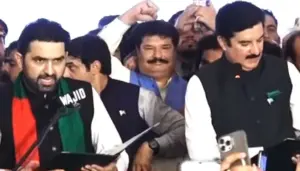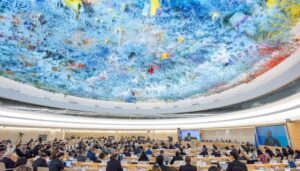claims that the security and cultural links of India depend on the stability of its neighbors. Mohan Bhagwat, the leader of the Rashtriya Swayamsevak Sangh (RSS), expressed concern on Thursday about political upheavals in India’s neighborhood, pointing to regime changes brought on by popular ire in Bangladesh, Nepal, and Sri Lanka. Bhagwat warned that comparable forces were at work in India during his yearly Vijayadashami speech in Nagpur, emphasizing the necessity of using democratic means to effect change. Caution about nearby nations “There has been a lot of unrest in our neighboring countries in recent years. We are concerned about the regime changes brought about by violent outbreaks of public ire in Bangladesh, Sri Lanka, and more lately, Nepal,” Bhagwat stated.
He maintained that only democratic means can bring about significant change and cautioned that such disturbance may be abused by superpowers. “The desired transformation cannot be brought about by violent outbursts. Otherwise, the world’s dominant nations look for chances to play their own games in these situations,” he said. Bhagwat went on to say that because of their close historical and cultural links, India needed peace and prosperity in its neighbors.
Demand more than just security in regions affected by Naxal The RSS chairman also discussed the Naxal movement and other internal security issues. He called for long-term solutions while applauding the government’s efforts to curb extremism. “The government’s strong actions and the public’s realization of the harshness and emptiness of their philosophy have helped to bring the fanatical Naxalist movement under control to a significant extent. A thorough action plan is now necessary to guarantee justice, progress, goodwill, empathy, and harmony in these areas after these barriers have been lifted, he stated. Human adaptation and global challenges In his reflections on more general human concerns, Bhagwat mentioned the rapid advancement of technology, environmental problems, and the deterioration of societal systems.
Globally, scientific advancement and connectivity paint a promising image. The rate at which technology advances and the rate at which people adjust to it, however, differ significantly. Ordinary people may wind up dealing with a lot of issues as a result,” he stated. As signs of the disconnect between financial advancement and social adaptability, he cited international conflicts, environmental harm, deteriorating family relationships, and an increase in animosity. Bhagwat cautioned that these problems were being made worse by unfriendly forces that aimed to sever cultural and traditional ties.
He asserted that India could offer a well-rounded response to global issues, saying, “The world is eagerly awaiting solutions that are based on Bharatiya philosophy.” A “warning bell” for South Asia due to climate change Bhagwat emphasized the detrimental consequences of a consumer-driven development strategy in relation to environmental issues. He pointed to landslides, glacier loss, and erratic rainfall as indicators of accelerating climate change, especially in the Himalayas. The detrimental effects of the consumerist and materialist development paradigm are becoming more and more obvious everywhere. He warned that the emergence of these catastrophes in the Himalayas should serve as a warning to Bharat and other South Asian nations.
Celebrations of Vijayadashami and the centennial of the RSS The RSS held a sizable celebration at its Nagpur headquarters to commemorate the Vijaya Dashami festival. The occasion also served as a celebration of the RSS’s centennial since its founding in 1925. A ceremonial march and the customary Sangh Prarthana were part of the event. Senior politicians in attendance were Maharashtra Chief Minister Devendra Fadnavis and Union Minister Nitin Gadkari. The principal guest was former President Ram Nath Kovind, who was joined by a number of Indian and foreign leaders. The centennial celebration highlighted the RSS’s expanding sway over national affairs and gave Bhagwat a forum to express his worries about regional stability, domestic issues, and the future of the world.
The main point Optimism and caution were balanced in Bhagwat’s speech. He called for democratic participation, pushed for growth that is sustainable and based on cultural values, and issued a warning about both internal and external causes of instability. His insistence that social and climate issues be treated as urgent warning indicators reflected his main point, which is that change can only be achieved via fairness, harmony, and community responsibility.




















